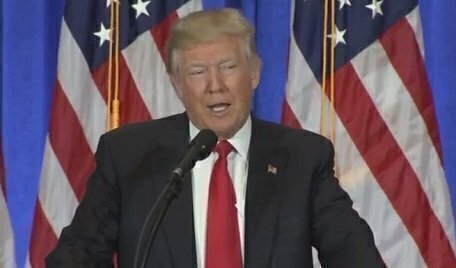President-elect Donald J. Trump is donating hotel room fees from foreign government officials and setting up a business trust to satisfy a potential conflict with the Emoluments Clause. But will the moves be enough to end a debate about the little-known constitutional provision?
 Article I, Section 9, of the Constitution contains what is known as the Foreign Emoluments Clause, which reads, “no Person holding any Office of Profit or Trust under them, shall, without the Consent of the Congress, accept of any present, Emolument, Office, or Title, of any kind whatever, from any King, Prince, or foreign State.” An emolument is defined by Merriam-Webster as “the returns arising from office or employment usually in the form of compensation or perquisites.”
Article I, Section 9, of the Constitution contains what is known as the Foreign Emoluments Clause, which reads, “no Person holding any Office of Profit or Trust under them, shall, without the Consent of the Congress, accept of any present, Emolument, Office, or Title, of any kind whatever, from any King, Prince, or foreign State.” An emolument is defined by Merriam-Webster as “the returns arising from office or employment usually in the form of compensation or perquisites.”
Link: Read About The Emoluments Clause On Our Interactive Constitution
A Trump legal representative, Sheri Dillon, said at a Wednesday press conference that proceeds gained by Trump-owned hotels from foreign government officials will not be retained by those businesses. The Trump hotels would remit those funds to the federal government. Dillon stressed the act was voluntary because “paying for a hotel room is not a gift or a present. … It is not an emolument.”
"Just like with conflicts of interests, he wants to do more than what the Constitution requires," Dillon said. "President-elect Trump has decided and we are announcing today that he is going to voluntarily donate all profits from foreign government payments made to his hotels to the United States Treasury."
Dillon also explained that that Trump is having his two oldest sons run his company during his time in the White House. His oldest daughter, Ivanka, will also have no connection to the company. Recent federal election documents show that Trump has financial interests in more than 500 domestic and foreign firms.
Trump’s assets will be placed into a type of trust that isn’t a blind trust, since it will be partially managed by his sons, but it will "completely isolate him from the management of the company,” Dillon said.
Trump’s company won’t start any new deals abroad and all domestic deals will be subject to an approval process, Dillon added. A new ethics officer will also join the company to be involved in a vetting process. She also explained that a complete liquidation of Trump’s assets into a blind trust would cause more potential conflicts. “President-elect Trump should not be expected to destroy the company he built,” Dillon said.
The vast Trump portfolio and its implications related to the Emoluments Clause have been the subject of speculation for months.
Back in November, the New York Times’ Adam Liptak wrote about a possible debate about how the clause would be evaluated as it applies to Trump’s business holdings. Liptak said that legal experts believed current arrangements, such as the Bank of China renting space in New York’s Trump Tower, could be called into question. But there is also very little precedent for someone with Trump’s business holdings assuming the presidency.
“The Supreme Court has never squarely considered the scope of the clause, and there are no historical analogies to help understand how it should apply to a president who owns a sprawling international business empire,” Liptak said.
Liptak also pointed out another debate: about the ability or standing of anyone to sue a President who violates the Emoluments Clause. And also Congress would have some say in the matter, since it can offer consent under the Emoluments Clause.
On Wednesday before the press conference, current Congresswoman Marcy Kaptur and former Representative Jill Long Thompson called on Trump to liquidate all his financial assets. Both are Democrats.
“To simply turn the management of Mr. Trump’s vast business interests over to his children fails to address his conflicts of interest, especially since relatives have been appointed to key White House posts. Mr. Trump must divest of both ownership and management of all his holdings, with the proceeds managed by a true blind trust. Congress must accept nothing less,” they argued.
Among the legal scholars, Will Baude from the University of Chicago Law School summed up the various arguments on the Volokh Conspiracy blog this Monday, with no clear consensus among academics who research this topic.
“I ultimately do not have a firm view on this question, which means I have not been wholly convinced by the very firm views I have seen bandied about on both sides,” Baude said.
These views include the theory that the Emoluments Clause doesn’t apply to Trump because he doesn’t hold “any Office of Profit or Trust” under the clause because another part of the Constitution assigns to the President a duty to “Commission all the Officers of the United States.” Another theory is that the Constitution had three Emoluments clauses.
Scott Bomboy is the editor in chief of the National Constitution Center.







